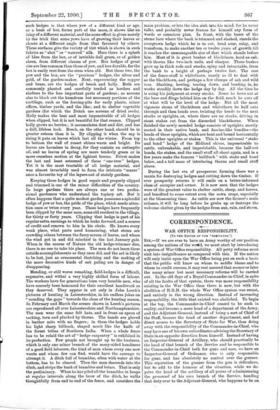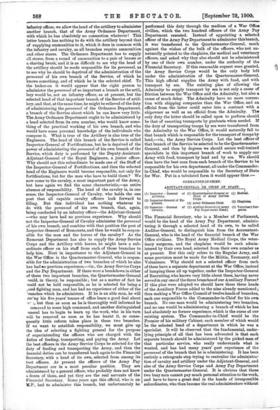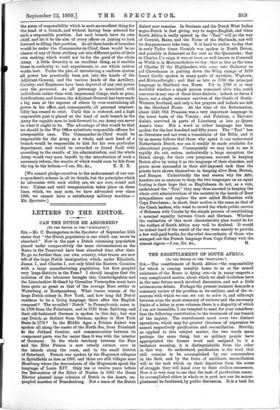CORRESPONDENCE.
WAR OFFICE RESPONSIBILITY.
go THE EDITOR. OP TIII1 "SPEOTATOR.1 Sin,—If we are ever to have an Army worthy of our position among the nations of the wcrid, we must start by introducing a system of War Office responsibility. All petty reforms must sink into insignificance as compared with this. If the nation will only insist upon the War Office being put on such a basis that the public will know on whom to saddle blame and to whom to credit success, it may rest assured that sooner or later the many minor but most necessary reforms will be carried out. In the old days of a Royal Commander-in-Chief, in spite of all the faults of that system, there was more responsibility existing in the War Office than there is now, but with the abolition of H.R.H. the whole War Office system was recast, and entirely in the wrong direction. Instead of increasing responsibility, the little that existed was abolished. To begin at the top, the Commander-in-Chief ceased to be such in reality, and became a mere head of a department of the Army, and the Adjutant-General, instead of being a sort of Chief of the Staff, became the head of another department, and had direct access to the Secretary of State for War, thus doing away with the responsibility of the Commander-in-Chief, who may have one of his own subordinates advising the Secretary of State in an opposite direction from himself. Instead of having an Inspector-General of Artillery, who should practically be the head of that branch of the Service and be responsible to the Commander-in-Chief both for guns and men, we have an Inspector-General of Ordnance, who is only responsible for guns, and has absolutely no control over the gunner. This separation of the gunner from the gun is ridiculous, but to add to the humour of the situation, while we de- prive the head of the artillery of all power of administering the personnel of his own branch of the Service, handing that duty over to the Adjutant-General, who happens to be an infantry officer, we allow the head of the artillery to administer another branch, that of the Army Ordnance Department, with which he has absolutely no connection whatever! This latter branch has nothing to do with the artillery beyond that of supplying ammunition to it, which it does in common with the infantry and cavalry, as all branches require ammunition and other stores. The Ordnance Department has to supply all stores, from a round of ammunition to a pair of braces or a shaving brush, and it is as difficult to see why the head of the artillery should be made responsible for its personnel, as to see why he should be deprived of the administration of the personnel of his own branch of the Service, of which he knows something, and of which he is the selected chief. To the looker-on it would appear that the right person to administer the personnel of so important a branch as the artil. lery would be, not an infantry officer, as at present, but the selected head of that important branch of the Service of artil- lery, and that, at the same time, he might be relieved of the duty of administering the personn-21 of the Ordnance Department, a branch of the Service about which he can know very little. The Army Ordnance Department ought to be administered by a head selected from its own number, who would know some- thing of the practical working of his own branch, and who would have some personal knowledge of the individnals who compose it. What is true of the Artillery is also true of the Engineers. The head of this branch of the Service is called Inspector-General of Fortifications, but he is deprived of the power of administering the personnel of his own branch of the Service, which duty is performed by the Deputy-Assistant- Adjutant-General of the Royal Engineers, a junior officer. Why should not this subordinate be made one of the Staff of the Inspector-General of Fortifications, and then the selected head of the Engineers would become responsible, not only for fortifications, but for the men who have to build them ? We now come to the cavalry, a most important part of the Army, but here again we find the same characteristic,—an entire absence of responsibility. The bead of the cavalry is, in one sense, the Inspector-General of Cavalry, who holds the one post that all capable cavalry officers look forward to filling. But this individual has nothing whatever to do with the personnel of his own branch, that, again, being conducted by an infantry officer—the Adjutant-General —who may have had no previous experience. Why should not the Inspector-General of Cavalry administer the personnel of his own branch, and combine with that position the post of Inspector-General of Remounts, and then he would be respon- sible for the men and the horses of the cavalry ? As the Remount Department has also to supply the Army Service Corps and the Artillery with horses, he might have a sub- ordinate officer on his staff from each of those branches to help him. Next in importance to the Adjutant-General in the War Office is the Quartermaster-General, who is respon- sible for the administration of two branches of which he also has had eo previous experience,—viz., the Army Service Corps and the Pay Department. If there were a breakdown in either of these two important branches, the Quartermaster-General could, in theory, be responsible ; but as a matter of fact he lould not be held responsible, as he is selected for being a ,,pod fighting man, and has had no experience of either of the 'ranches which he administers. If he is an able man, he will nir'ng his five years' tenure of office learn a good deal about :„ but then as soon as he is thoroughly well informed he removed to some high command, and another distinguished -eneral has to begin to learn up the work, who in his turn will be removed as soon as he has learnt it, so conse- quently little reform takes place in these two branches. If we want to establish responsibility, we must give up the idea of selecting a fighting general for the purpose of superintending the officers who are charged with the duties of feeding, transporting, and paying the Army. Let The best officers in the Army Service Corps be selected for the duty of feeding and transporting the Army, and then the imancial duties can be transferred back again to the Financial Secretary, with a head of its own, selected from among its best officers. At present the officers of the Army Pay Department are in a most peculiar position. They are administered by a general officer, who probably does not know t dozen of them, and yet they, are the real servants of the Financial Secretary. Some years ago this official, who is an had to administer this branch, but unfortunately he performed this duty through the medium of a War Office civilian, which the two hundred officers of the Army Pay Department resented. Instead of appointing a selected officer of the Army Pay Department to administer this branch, it was transferred to the Quartermaster-General, much against the wishes of the bulk of the officers, who not un- naturally pointed to the chaplains, the medical and veterinary officers, and asked why they also should not be administered by one of their own number, under the authority of the Financial Secretary. If this reasonable request were granted, the Army Service Corps would be the only body left under the administration of the Quartermaster-General This high official supplies the Army with food, and with transport by sea. The existing plan of allowing the Admiralty to supply transport by sea is not only a cause of friction between the War Office and the Admiralty, but also a cause of much delay. The Admiralty have no more connec- tion with shipping companies than the War Office, and an official from the latter could enter into a contract with a shipowner as well as an official from the Admiralty. The only duty the latter should be called upon to perform should be that of escorting transports by gunboats when needed. If the duty of transporting troops by sea were transferred from the Admiralty to the War Office, it would naturally fall to that branch which is responsible for the transport of troops by land,—viz., the Army Service Corps. Let the beat officer of that branch of the Service be selected to be the Quartermaster- General, and then by degrees we should secure well-trained specialists in this important branch of work to supply our Army with food, transport by land and by sea. We should then have the best man from each branch of the Service to be responsible for his own department, all under the Commander. in-Chief, who would be responsible to the Secretary of State for War. Put in a tabulated form it would appear thus :—
(2) Chaplain'.
(3) Veterinary Sur. geons.
The Financial Secretary, who is a Member of Parliament, would be the head of the Army Pay Department, adminis- tering it through a selected head of its own, to be called Auditor-General, to distinguish him from the Accountant- General, who is the head of the financial branch of the War Office civilians. The Royal Army Medical Corps, the veter- inary surgeons, and the chaplains would be each admin- istered by tEeir own head, selected from their own number as at present. But this only refers to the Regular Army, and some provision must be made for the Militia, Yeomanry, and Volunteers. Why should not a selected officer from each of these have a separate department at the War Office, instead of lumping them all up together, under the Inspector-General of Recruiting,who knows very little about them, having never served in any one of the three branches of our Auxiliary Forces? If this plan were adopted we should have these three heads of the Auxiliary Forces added to the nine already mentioned ; thus making a War Office Council of twelve heads of branches, each one responsible to the Commander-in-Chief for his own branch. No one man would be administering two branches, and no one would be administering a branch of which he has had absolutely no former experience, which is the curse of our existing system. The Commander-in-Chief would be the Premier of his military Cabinet, each member of which would be the selected bead of a department in which he was a specialist. It will be observed that the fundamental, under- lying principle of all that has been advocated is that each separate branch should be administered by the picked man of that particular service, who really understands what is wanted, and has had many years' past experience of the personnel of the branch that he is administering. It has been entirely a retrograde step trying to centralise the administra- tion of cavalry and artillery under the Adjutant-General, and also of the Army Service Corps and Army Pay Department under the Quartermaster-General. It is obvious that these two busy men cannot pay much personal attention to the work, and have to leave a great deal in the hands of irresponsible subordinates, who then become the real administrators without
COMMANDER-IN-CHIEF.
ADJ1JTANT-GENERAL OR CFIIEF OF STAFF.
•
(1) Inspector - General of (1) QuartermaIster-General or (1) MediCal. Artillery. Head of Army service (2) Inspector-General of En- Corps'
glneers. (2) Army Ordnance Chief.
(3) Inspector - General of (3) Anditor-General (or Army Cavalry. Pay Department Head).
the sense of responsibility which is such an excellent thing for the head of a branch, and without having been selected for such a responsible position. Let each branch have its own chief, and let it be the aim of every officer on joining to look forward to filling that position. As all these heads of branches would be under the Commander-in-Chief, there would be no chance of any of them striking out into different paths of their own seeking, which would not be for the good of the whole Army. A little diversity is an excellent thing, as it enables those in authority to test experiments, to see which system works best. Under the plea of introducing a uniform system all power has practically been put into the hands of the Adjutant-General, and the various heads of the Artillery, Cavalry, and Engineers have been deprived of any real power over the personnel. As all patronage is associated with individuals rather than with impersonal things, such as guns, fortifications, and horses, the Adjutant-General has been made a big man at the expense of others by over-centralising all power in his office, and, consequently, all personal responsi- bility has ceased to exist. Until this is restored, and a high responsible post is placed at the head of each branch in the Army for capable men to look forward to, our Army can never be what it ought to be. The advantage of this would be that we should in the War Office substitute responsible officers for irresponsible ones. The Commander-in-Chief would be responsible for the Army as a whole, and each head of a branch would be responsible to him for his own particular department, and would be rewarded or found fault with according to the results of his administration, and the whole Army would very soon benefit by the introduction of such a necessary reform, the results of which would soon be felt from
the top to the bottom.—I am, Sir, &c., X. X. X.
[We cannot pledge ourselves to the endorsement of our cor- respondent's scheme in all its details, but the principles which he advocates with such ability are, we are sure, sound and true. Unless and until reorganisation takes place on these lines, which, we may note, we have advocated ever since 1895, we cannot have a satisfactory military machine.— En. Spectator.]








































 Previous page
Previous page